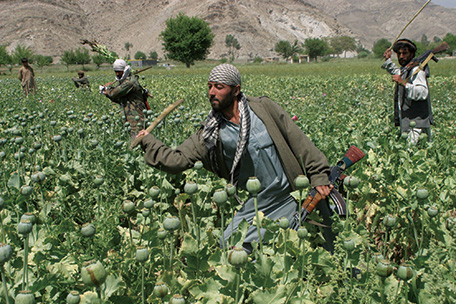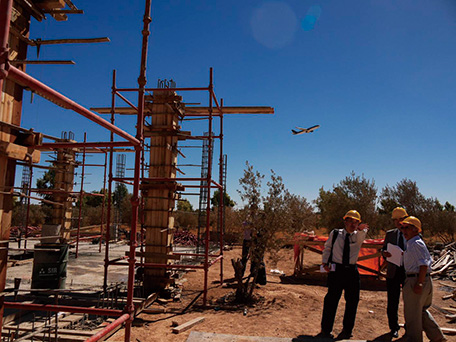Japan's Official Development Assistance White Paper 2012
(6) Transnational Organized Crime and Terrorism
The progress of globalism, proliferation of high-tech devices and greater mobility of people have turned transnational organized crime and terrorism into threats to the entire global community. International organized crime, including the illicit trade of narcotic drugs and firearms, illegal immigration, trafficking in women and children, smuggling of cash, forgery of currencies, and money laundering*, has become increasingly diverse and sophisticated in its methods in recent years. Al-Qaeda leader Osama bin Laden died in May 2011, nearly a decade after the September 2001 terrorist attacks on the United States, but the radical violence of organizations influenced by Al-Qaeda's terrorist techniques pose a new threat.
There is only so much that individual countries can do to combat transnational organized crime, piracy and terrorism. Therefore, in addition to strengthening the measures implemented by each country, it is necessary for the entire international community to eliminate all legal loopholes through efforts such as assistance for capacity building to handle criminal justice and law enforcement in developing countries.
<Japan's Efforts>
●Against Narcotic Drugs
In addition to participating proactively in international meetings of the UN Commission on Narcotic Drugs, Japan contributes to the United Nations International Drug Control Programme (UNDCP) Fund of the United Nations Office on Drugs and Crime (UNODC) to provide assistance to developing countries, particularly in Asia. In FY2011, Japan used a contribution of $1.26 million to the UNDCP Fund for projects including monitoring the illegal production of poppies (plants grown as ingredients for the drug opium) in Myanmar and synthetic drugs throughout Southeast Asia and other areas. Japan also contributed $13.6 million to the UNDCP Fund and the Crime Prevention and Criminal Justice Fund (CPCJF) in March 2012 to support anti-drug measures and border control in Afghanistan and neighboring countries. Additionally, through the United Nations Asian and Far East Institute for the Prevention of Crime and the Treatment of Offenders (UNAFEI) Japan supported the training for treatment of drug offenders.

Afghan police storming a poppy field planted for drug use in the Shinwar District of Nangarhar Province. (Photo: Said Jan Sabaoon/JICA)
●Against Trafficking in Persons
In FY2011, Japan contributed approximately $41,000 to the CPCJF of UNODC (See Against Narcotic Drugs) for projects to combat trafficking in persons. In addition, in August 2011, Japan decided to extend assistance totaling $2.36 million through the UN Trust Fund for Human Security which Japan had taken the lead in founding to a project entitled "Protecting and empowering victims of trafficking in Indonesia" which is implemented by the International Organization for Migration (IOM) and other organizations.
Japan is focusing on supports of palliative care (psychological care through art therapy and other methods) and the social reintegration of victims. In the past, Japan has utilized contribution to the CPCJF to implement projects for measures against trafficking in persons in Pattaya, Thailand (protection of children from trafficking in persons and sexual exploitation), and provide the Philippines National Police to develop Standard Operating Procedures for the investigation of trafficking in persons in the Philippines. Japan is considering support focused on Southeast Asia in the future as well. Further, Japan provides assistance through the IOM for the safe repatriation of victims of trafficking and their reintegration in their home countries, who are under protection in Japan. Moreover, Japan provides support for the Bali Process, which is a framework of illegal immigration, trafficking in persons, and transnational crime in the Asia-Pacific region. Through UNAFEI, Japan also implemented training on measures against human trafficking in persons.
●Against Counter-Terrorism
The international community must make efforts to prevent methods of terrorism and safe havens from falling into the hands of terrorists, and to overcome vulnerabilities to terrorism. Japan provides assistance to developing countries that do not necessarily have sufficient capability to counter terrorism in order to improve their counter-terrorism capabilities. Particularly Japan has intensified its support to help fight terrorism in developing countries ever since grant aid for cooperation on counter-terrorism and security enhancement was established in 2006.
Japan has a close relationship with Southeast Asia, and it has stepped up its support in that region because it is especially important to Japan to prevent terrorism and maintain safety there. Specifically, Japan provides equipment, dispatches experts, hosts seminars and accepts trainees across various fields of immigration control, aviation security, port and maritime security, cooperation with customs, export control, cooperation for law enforcement, measures against terrorist financing (measures to cut off the flow of money toward terrorists and terrorist organizations) and encouraging the conclusion of the international counter-terrorism convention and protocol.
For example, Japan invited officials involved in measures against terrorism from Central Asian countries to a seminar it hosted in December 2011 to deepen their understanding of international counter-terrorism conventions and protocols and to encourage the conclusion of them. In addition, in FY2011, Japan contributed approximately $41,000 to the UNODC Terrorism Prevention Branch to support the establishment of counter-terrorism laws in Indonesia and other ASEAN countries.
●Against Corruption
As part of its efforts against corruption, Japan supports for hosting seminars on corruption prevention measures in Viet Nam and Laos through contributions to the CPCJF. This contributed to the strengthening of initiatives to combat corruption in these countries, which are also recipients of Japan's ODA. Japan contributed $41,000 to host seminars in 2011 as well and will hold the same type of seminar in Laos and Cambodia in the future.
Further, through the UNAFEI various training courses and seminars have been held for criminal justice professionals from developing countries mainly in the Asia-Pacific region and other regions. Topics included protection of witnesses and whistle-blowers and securing their cooperation, prevention of corruption, etc. Each of the topics is a priority issue stipulated in the United Nations Convention against Transnational Organized Crime and the United Nations Convention against Corruption. These efforts contribute to the sound development of criminal justice and the strengthening of cooperative relationships in each country.
●Against Piracy
Japan is a maritime nation that depends largely on maritime transport for the import of energy and food resources and trade. Measures of ensuring the safety of maritime navigation, such as those against terrorism and piracy, are issues that have a direct link to Japan's prosperity and existence as a nation. Furthermore, maritime safety is an essential prerequisite for the economic development of the region.
In recent years, many incidents of piracy have occurred off the coast of Somalia and in the Gulf of Aden in eastern Africa. While efforts made by the international community have decreased the successful highjack rate, the number of pirate attacks in 2011 reached 237, remaining still quite high. The area where incidents of piracy occur has expanded from the area off the coast of Somalia and in the Gulf of Aden to the whole western part of the Indian Ocean. Piracy is becoming a significant threat to the safety of maritime navigation.
In response to these threats, Japan has been deploying two destroyers and two P-3C patrol aircrafts of its Maritime Self-Defense Force in the area off the coast of Somalia and in the Gulf of Aden to carry out counter-piracy missions based on the Act on Punishment and Countermeasures against Piracy enacted in June 2009. Japan Coast Guard law enforcement officers also are on the destroyers to make arrests, question detainees and perform other duties of judicial law enforcement activities when acts of piracy have been committed.
In order to solve the problems with Somali pirates, multilayered efforts are necessary to enhance the maritime law enforcement capabilities of coastal countries, and to improve stability in Somalia, which is of particular relevance to the increase in piracy in addition to the above maritime defense. As part of these efforts, Japan contributed a total of $14.6 million to an International Maritime Organization (IMO (Note 13)) trust fund to implement to the Djibouti Code of Conduct (a regional framework for improving maritime security capabilities in Somalia and neighboring countries). This Trust Fund has been used to set up and operate information-sharing centers for anti-piracy measures in Yemen, Kenya and Tanzania, and establish a Djibouti Regional Training Center, which is currently under construction. The IMO is also conducting training programs to improve maritime security capabilities in countries surrounding Somalia.
In addition, Japan has contributed a total of $3.5 million to the Trust Fund to Support Initiatives of States Countering Piracy off the Coast of Somalia to help improve the capabilities of Somalia and neighboring countries to take legal actions against and crack down on alleged pirates in an effort to assist the international community in preventing the reoccurrence of piracy. In addition, in cooperation with the Japan Coast Guard, Japan has carried out training programs for the control of maritime crime, inviting maritime security officers from the countries around Somalia. Since 2007, Japan has disbursed approximately $229.1 million to Somalia in assistance to strengthen domestic security, provide humanitarian aid, and develop the infrastructure.
- *Money laundering
- Money laundering refers to the act of disguising funds or proceeds obtained from criminal activities as legally obtained assets, or the act of hiding such funds. Example) A drug dealer opens a bank account under a false name and hides money obtained through drug transactions in that account.
Note 13: On January 1, 2012, former IMO Maritime Safety Division Director Koji Sekimizu was elected as IMO Secretary-General.
●Jordan
Project for Improvement of Airport Security Equipment at Queen Alia International Airport in Jordan
Grant Aid for Cooperation on Counter-Terrorism and Security Enhancement (August 2009 - Present)
Jordan is surrounded by Iraq, Israel, Palestine, Syria and Saudi Arabia and is susceptible to the political circumstances of those countries. Jordan is relatively secure and stable compared to other Middle Eastern countries, but people illegally brought weapons into the country from neighboring countries in the past, and incidents defined as terrorism have occurred. While tourism is one of the main industries in Jordan, the development of tourism industry depends heavily on maintaining public safety. Queen Alia International Airport in the capital city of Amman is the world's entrance to Jordan, and a Middle Eastern hub through which passed approximately 5.4 million travelers and treated 83,000 tons of cargo per year (both 2010 figures). Due to a lack of security equipment, Jordan had to rely only on visual inspections and random baggage inspections of travelers and cargo entering the country through the airport. In addition, required time for cargo inspections is an obstacle of the smooth logistics of goods. Japan decided to provide grant aid to install X-ray inspection and explosive detection systems to resolve above-mentioned issues. As one of the most effective ways of security measures is to fortify borders, Japan's assistance is helping to enhance the security system at the airport and to prevent terrorism before it strikes. Furthermore, it contributes to smooth logistics of goods by shortening the container inspection time from an average of two hours to a few minutes.
(As of December 2012)

Installing an X-ray inspection system. (Photo: JICA)
